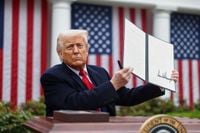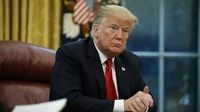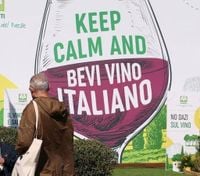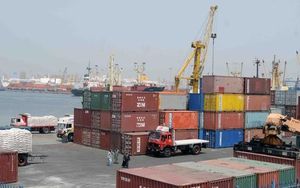In a dramatic turn of events, the tiny southern African nation of Lesotho is sending a high-level delegation to the United States in a bid to mitigate the economic fallout from a staggering 50% tariff imposed by former President Donald Trump. This tariff, announced on April 2, 2025, threatens to decimate Lesotho's textile industry, which is crucial to its economy, accounting for over 10% of the country’s GDP.
Lesotho, known for its denim and textiles that supply American brands such as Levi's and Calvin Klein, faces a potential economic crisis. The government has urged citizens not to panic, but the reality is grim. The Trade Minister, Mokhethi Shelile, described the U.S. tariff as "shocking" during a parliamentary session on April 4, highlighting the precarious nature of Lesotho's economy, which is one of the poorest in the world.
According to the consulting firm Oxford Economics, the textile sector employs about 40,000 workers in Lesotho. The country, encircled by South Africa, imposes a staggering 99% tariff on American goods, making the new U.S. tariffs particularly devastating. Economic analyst Thabo Qhesi warned that the 50% tariff could "kill the textile and apparel sector in Lesotho," leading to widespread unemployment and economic collapse.
Interestingly, Trump’s own branded golf shirts, produced under the Greg Norman label, are reportedly made in Lesotho, raising eyebrows about the implications of his tariff policies. The shirts, which feature the label "Made in Lesotho," were still available for purchase on the Trump Organization’s official website, sparking questions about the president’s commitment to his own trade policies.
As Lesotho grapples with the impending economic crisis, the U.S. is simultaneously facing its own trade dilemmas. Trump administration officials are reportedly considering the introduction of a new exporter tax credit as a counterweight to the tariffs, acknowledging the potential harm these policies could inflict on American companies. This proposal, which would require Congressional approval, aims to bolster U.S. manufacturers and mitigate the impact of retaliatory tariffs.
This internal discussion within the Trump administration reflects growing concerns about the effectiveness of the president’s trade policies. As trade wars escalate, the U.S. markets have already begun to feel the strain. On April 7, 2025, the Dow Jones Industrial Average experienced a sharp decline of over 3%, marking one of the largest single-day drops in recent history. Investors are increasingly anxious about the potential long-term effects of ongoing trade tensions.
Meanwhile, the Italian wine industry is also reeling from the repercussions of Trump’s tariff policies. On April 7, 2025, reports emerged from the Vinitaly wine fair in Verona, where Italian producers expressed deep concern over a new 20% tariff on European imports, including their wines. Italy is the largest exporter of wine to the U.S., with sales reaching €2 billion ($2.2 billion) last year, representing about 25% of the country’s total global wine exports.
Lamberto Frescobaldi, chairman of the Italian Wine Union, estimated that Italian wine exports to the U.S. could suffer a loss of approximately €323 million annually under the current tariff structure. Importers like Simone Luchetti, president of Banville Wine Merchants, anticipate a 25% to 35% drop in both consumption and revenue due to the tariff-induced price increases.
Charles Lazzara, founder of Volio Imports, highlighted that American consumers are highly sensitive to price changes. A mid-range Prosecco currently priced at $10.99 could soon jump to $12.99 due to the new duties, potentially pushing some brands out of the market entirely. This shift in consumer behavior could have lasting effects on the Italian wine sector.
Despite the challenges, some producers remain optimistic. Giancarlo Moretti-Polegato, owner of Villa Sandi, believes that certain wines, like Prosecco, cannot be easily replaced by cheaper alternatives from other countries. However, the fear of a trade war looms large, as retaliatory measures from Europe could target American products like bourbon whiskey, escalating tensions further.
The situation remains fluid as both Lesotho and the U.S. navigate these turbulent trade waters. Lesotho's delegation aims to convince U.S. officials to reconsider the tariffs that threaten their fragile economy, while American manufacturers and wine importers brace for the impact of retaliatory tariffs. As discussions unfold, the broader implications of these trade policies will undoubtedly shape the economic landscape for years to come.
In this complex web of international trade, the stakes are high not just for Lesotho and Italy, but for the global economy as a whole. With each new tariff and countermeasure, the delicate balance of trade relationships hangs in the balance, leaving many to wonder what the future holds.






